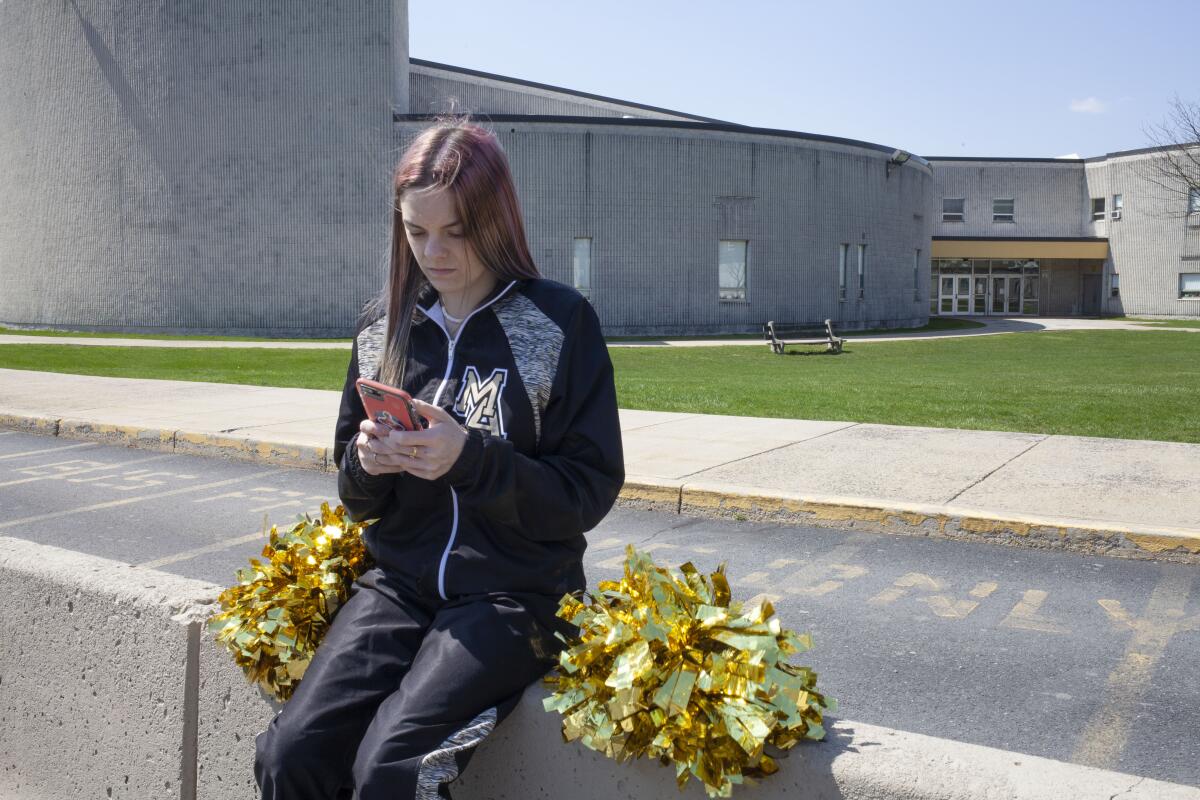Supreme Court upholds a student’s right to free speech on social media

- Share via
WASHINGTON — The Supreme Court on Wednesday gave students their biggest free speech victory in decades, ruling that a disappointed high school cheerleader could not be punished for a social media post on Snapchat that included profane words.
In an 8-1 decision, the justices said a Pennsylvania school district violated the 1st Amendment when it suspended Brandi Levy from the cheerleading team in response to her post.
The court in an opinion by Justice Stephen G. Breyer said her words may have offended school officials, but they did not otherwise disrupt the school. And he said courts should be skeptical of efforts to discipline students for what they say or post on their own free time.
“It might be tempting to dismiss B. L.’s words as unworthy of the robust 1st Amendment protections discussed herein. But sometimes it is necessary to protect the superfluous in order to preserve the necessary,” he wrote in Mahanoy School District vs. B.L.
Only Justice Clarence Thomas dissented and said he does not believe students and children have such protected rights.
American Civil Liberties Union lawyers who represented Levy welcomed the outcome.
“Protecting young people’s free speech rights when they are outside of school is vital, and this is a huge victory for the free speech rights of millions of students who attend our nation’s public schools,” said David Cole, legal director of the ACLU.
The incident in this case occurred in May 2017, when Levy was in ninth grade. She graduated in 2020 and is now a freshman in college.
“The school went too far, and I’m glad that the Supreme Court agrees,” Levy said in a statement. “I was frustrated. I was 14 years old, and I expressed my frustration the way teenagers do today. Young people need to have the ability to express themselves without worrying about being punished when they get to school. I never could have imagined that one simple snap would turn into a Supreme Court case, but I’m proud that my family and I advocated for the rights of millions of public school students.”
Her case posed a question that has divided courts in recent decades. Are students entirely free to say what they wish on social media — even if it includes vulgar, harassing or racist comments — or can they be disciplined by school officials?
During the Vietnam War, the Supreme Court ruled in 1969 that students retained their free speech rights when they went to school, so long as their protests did not cause “substantial disruptions” there. But that landmark ruling in Tinker v. Des Moines has provided little guidance for how to view a student’s posts on social media.
Breyer’s opinion did not set a clear rule or say students are always protected for what they post. But he said those from “off-campus will normally fall within the zone of parental, rather than school-related, responsibility. ...When it comes to political or religious speech that occurs outside school or a school program or activity, the school will have a heavy burden to justify intervention.”
The case began when Levy learned she had been passed over for the varsity cheerleading team.
On a Saturday afternoon, she took a photo of herself and a friend with their middle fingers raised and posted it on Snapchat. She included a caption repeating the F-word for “school ... softball ... cheer ... everything.”
The post could be seen by 250 of her friends, including other cheerleaders, and they in turn showed it to the two cheerleading coaches for Mahanoy High School in central Pennsylvania.
They decided she had violated team rules that required showing “respect” to others and avoiding “foul language,” and they suspended her for the year from the junior varsity squad.
She and her parents appealed the decision to school officials and the school board. And when that failed, they sued in federal court, alleging a violation of her 1st Amendment right to the freedom of speech.
A federal judge ruled for Levy, who said her Saturday afternoon posting did not disrupt her school. The U.S. 3rd Circuit Court of Appeals in Philadelphia agreed and ruled the school’s authority did not extend to off-campus speech.
More to Read
Get the L.A. Times Politics newsletter
Deeply reported insights into legislation, politics and policy from Sacramento, Washington and beyond. In your inbox twice per week.
You may occasionally receive promotional content from the Los Angeles Times.











